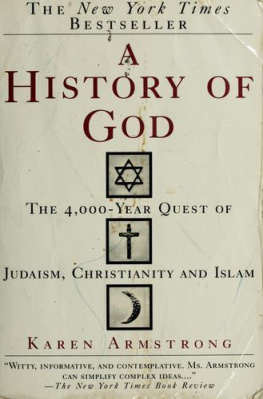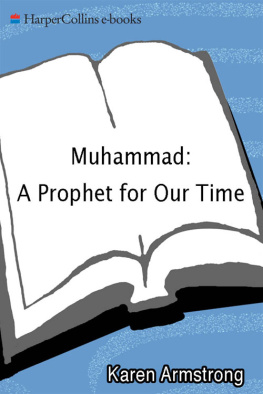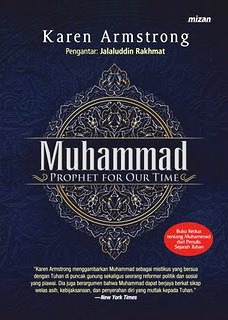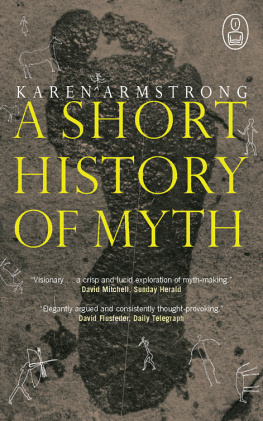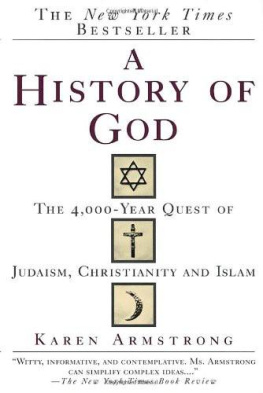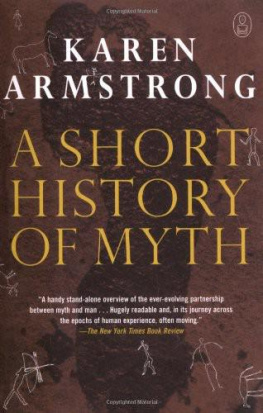Karen Armstrong - Islam: A Short History (Modern Library Chronicles)
Here you can read online Karen Armstrong - Islam: A Short History (Modern Library Chronicles) full text of the book (entire story) in english for free. Download pdf and epub, get meaning, cover and reviews about this ebook. year: 2007, publisher: Modern Library, genre: Religion. Description of the work, (preface) as well as reviews are available. Best literature library LitArk.com created for fans of good reading and offers a wide selection of genres:
Romance novel
Science fiction
Adventure
Detective
Science
History
Home and family
Prose
Art
Politics
Computer
Non-fiction
Religion
Business
Children
Humor
Choose a favorite category and find really read worthwhile books. Enjoy immersion in the world of imagination, feel the emotions of the characters or learn something new for yourself, make an fascinating discovery.

- Book:Islam: A Short History (Modern Library Chronicles)
- Author:
- Publisher:Modern Library
- Genre:
- Year:2007
- Rating:5 / 5
- Favourites:Add to favourites
- Your mark:
- 100
- 1
- 2
- 3
- 4
- 5
Islam: A Short History (Modern Library Chronicles): summary, description and annotation
We offer to read an annotation, description, summary or preface (depends on what the author of the book "Islam: A Short History (Modern Library Chronicles)" wrote himself). If you haven't found the necessary information about the book — write in the comments, we will try to find it.
Islam: A Short History (Modern Library Chronicles) — read online for free the complete book (whole text) full work
Below is the text of the book, divided by pages. System saving the place of the last page read, allows you to conveniently read the book "Islam: A Short History (Modern Library Chronicles)" online for free, without having to search again every time where you left off. Put a bookmark, and you can go to the page where you finished reading at any time.
Font size:
Interval:
Bookmark:


Table of Contents
Modern Library Chronicles
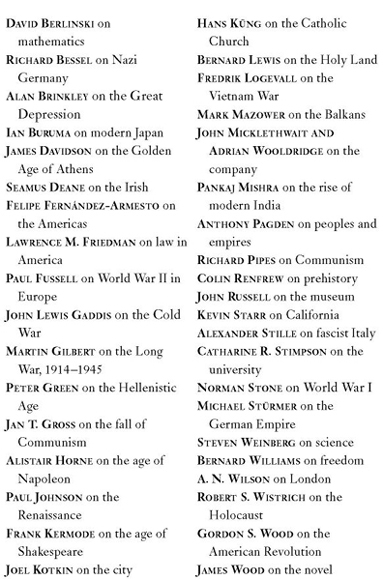
MAPS
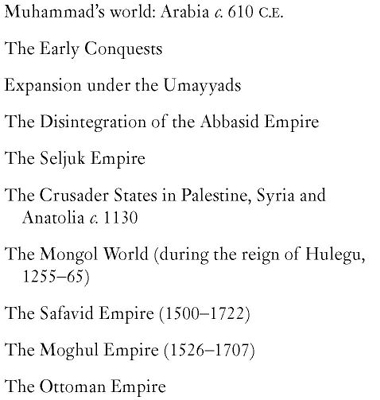
CHRONOLOGY
The Prophet Muhammad receives the first revelations of the Quran in Mecca and, two years later, begins to preach.
Relations between the Meccan establishment and Muhammads converts deteriorate; there is persecution and Muhammads position becomes increasingly untenable in Mecca.
Arabs from the settlement of Yathrib (later called Medina) make contact with Muhammad and invite him to lead their community.
The Prophet together with some seventy Muslim families make the hijrah, or migration, from Mecca to Medina and the Meccan establishment vows revenge. The hijrah marks the beginning of the Muslim era.
Muslims inflict a dramatic defeat on Mecca at the Battle of Badr.
Muslims suffer a severe defeat at the hands of the Meccan army at the Battle of Uhud, outside Medina. The Jewish tribes of Qaynuqah and Nadir are expelled from Medina for collaborating with Mecca.
Muslims soundly defeat the Meccan army at the Battle of the Trench. This is followed by the massacre of the men of the Jewish tribe of Qurayzah, which had supported the Meccans against the Muslims.
Muhammads daring peace initiative results in the Treaty of Hudaybiyyah between Mecca and Medina. He is now seen as the most powerful man in Arabia and attracts many of the Arabian tribes into his confederacy.
The Meccans violate the Treaty of Hudaybiyyah. Muhammad marches on Mecca with a large army of Muslims and their tribal allies. Mecca recognizes its defeat and voluntarily opens the gates to Muhammad, who takes the city without bloodshed and without forcing anybody to convert to Islam.
Death of the Prophet Muhammad. Abu Bakr is elected his khalifah (representative).
63234 The caliphate of Abu Bakr and the wars of riddah against tribes who secede from the confederacy. Abu Bakr manages to subdue the revolt and unite all the tribes of Arabia.
63444 The caliphate of Umar ibn al-Khattab. The Muslim armies invade Iraq, Syria and Egypt.
The Muslims conquer Jerusalem, which becomes the third holiest city in the Islamic world after Mecca and Medina.
The Muslims control Syria, Palestine and Egypt; they have defeated the Persian Empire and, when manpower is available, will occupy its territories. The garrison towns of Kufah, Basrah and Fustat are built to house the Muslim troops, who live separately from the subject population.
Caliph Umar is assassinated by a Persian prisoner of war. Uthman ibn Affan is elected the third caliph.
64450 Muslims conquer Cyprus, Tripoli in North Africa and establish Muslim rule in Iran, Afghanistan and Sind.
Caliph Uthman is assassinated by malcontent Muslim soldiers, who acclaim Ali ibn Abi Talib as the new caliph, but not all accept Alis rule.
65660 The first fitnah. Civil war ensues.
The Battle of the Camel. Aisha, the Prophets wife, Talhah and Zubayr lead a rebellion against Ali for not avenging Uthmans murder. They are defeated by Alis partisans. In Syria the opposition is led by Uthmans kinsman Muawiyyah ibn Abi Sufyan.
An attempt is made to arbitrate between the two sides at Siffin; when the arbitration goes against Ali, Muawwiyyah deposes him and is proclaimed caliph in Jerusalem. The Kharajites secede from Alis camp.
Ali is murdered by a Kharajite extremist. Alis supporters acclaim his son Hasan as the next caliph, but Hasan comes to an agreement with Muawiyyah and retires to Medina.
66180 The caliphate of Muawiyyah I. He founds the Umayyad dynasty, and moves his capital from Medina to Damascus.
The death of Hasan ibn Ali in Medina.
Yazid I becomes the second Umayyad caliph on the death of his father, Muawiyyah.
68092 The second fitnah. Another civil war ensues.
The Muslims of Kufah, who call themselves the Shiah i-Ali (the Partisans of Ali), acclaim Husain, the second son of Ali ibn Abi Talib, as caliph. Husain sets out from Medina to Kufah with a tiny army and is killed on the plain of Kerbala by Yazids troops. Abdallah ibn al-Zubayr revolts against Yazid in Arabia.
Death of Yazid I. Death of his infant son, Muawiyyah II. Accession of Marwan I, the Umayyad claimant to the caliphate, who is supported by the Syrians.
Kharajite rebels against the Umayyads set up an independent state in central Arabia. Kharajite uprisings in Iraq and Iran. Shii uprising in Kufah.
685705 Caliphate of Abd al-Malik, who manages to restore Umayyad rule.
Umayyad forces defeat the Kharajite and Shii rebels. The Dome of the Rock is completed in Jerusalem.
Umayyad forces defeat and kill Ibn al-Zubayr. As a result of the fitnah wars, a religious movement develops in Basrah, Medina and Kufah; various schools campaign for a more stringent application of the quarah in public and private life.
70517 Caliphate of al-Walid. Muslim armies continue the conquest of North Africa and establish a kingdom in Spain.
71720 Caliphate of Umar II. The first caliph to encourage conversion to Islam. He tries to implement some of the ideals of the religious movement.
72024 Caliphate of Yazid II, a dissolute ruler. There is widespread Shii and Kharajite discontent with Umayyad government.
72443 Caliphate of Hisham I, a devout but more autocratic ruler, who also antagonizes the more pious Muslims.
Death of Hasan al-Basri, hadith scholar, religious reformer and ascetic.
The Battle of Poitiers. Charles Martel defeats a small raiding party of Spanish Muslims. Abu Hanifah pioneers the study of fiqh. Muhammad ibn Ishaq writes the first major biography of the Prophet Muhammad.
74344 The Abbasid faction begins to muster support against the Umayyads in Iran, fighting under the banner of the Shiah.
Caliphate of Walid II.
74449 Marwan II seizes the caliphate and tries to restore Umayyad supremacy against the insurgents. His Syrian forces suppress some of the Shii revolts, but:
The Abbasids conquer Kufah and overthrow the Umayyads.
75054 Caliph Abu al-Abbas al-Saffah, the first Abbasid caliph, massacres all the members of the Umayyad family. A sign of an absolute monarchy that is new to Islam.
75575 Caliphate of Abu Jafar al-Mansur. He murders prominent Shiis.
Spain secedes from the Abbasid caliphate, setting up an independent kingdom under the leadership of one of the Umayyad refugees.
The foundation of Baghdad, which becomes the new Abbasid capital.
The death of Jafar as-Sadiq, the Sixth Imam of the Shiah, who urges his Shii disciples to withdraw on principle from politics.
Death of Abu Hanifa, the founder of the first of the great schools of Islamic law.
77585 Caliphate of al-Mahdi. He encourages the development of fiqh, acknowledges the piety of the religious movement, which gradually learns to coexist with the absolutism of the Abbasid dynasty.
786809 Caliphate of Harun al-Rashid. The zenith of Abbasid power. A great cultural renaissance in Baghdad and other cities of the empire. Besides patronizing scholarship, science and the arts, the caliph also encourages the study of
Next pageFont size:
Interval:
Bookmark:
Similar books «Islam: A Short History (Modern Library Chronicles)»
Look at similar books to Islam: A Short History (Modern Library Chronicles). We have selected literature similar in name and meaning in the hope of providing readers with more options to find new, interesting, not yet read works.
Discussion, reviews of the book Islam: A Short History (Modern Library Chronicles) and just readers' own opinions. Leave your comments, write what you think about the work, its meaning or the main characters. Specify what exactly you liked and what you didn't like, and why you think so.


